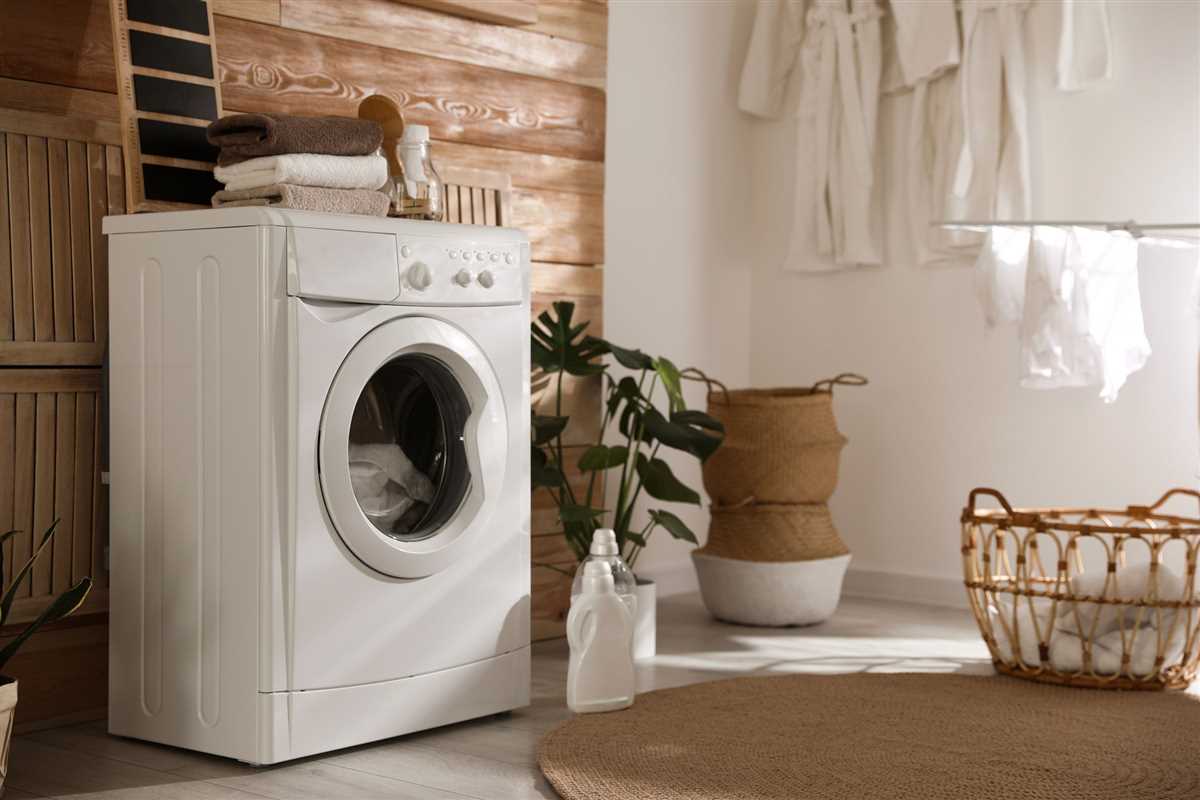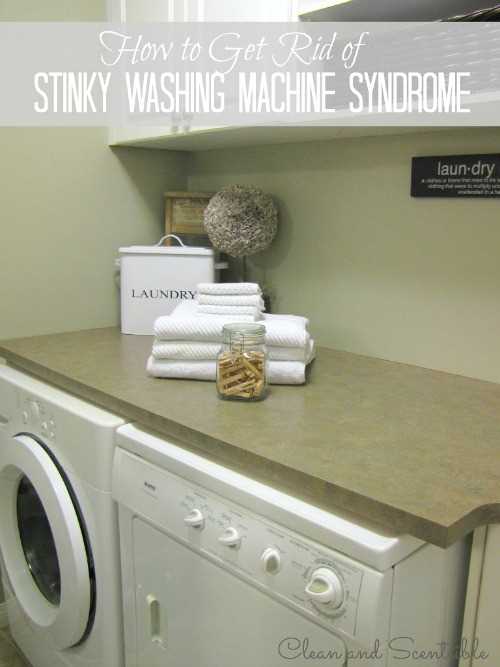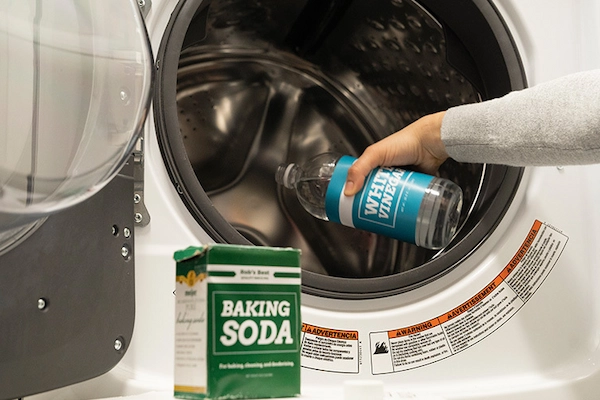




Does your washing machine emit a less-than-pleasant odor? If so, you’re not alone. A stinky washing machine is a common issue that many households face. But what exactly causes this unpleasant smell, and more importantly, how can you solve it? In this article, we’ll dive into the most common causes of a smelly washing machine and provide you with expert tips on how to get rid of that unwanted odor.
One of the main culprits behind a smelly washing machine is the buildup of mold and mildew. These pesky fungi thrive in the moist and warm environment of your washing machine, especially if it’s used frequently. Over time, mold and mildew can accumulate in all the nooks and crannies of your machine, including the rubber gasket, detergent drawer, and drum. This buildup not only causes a musty odor but can also lead to health issues if left untreated.
Another common cause of a smelly washing machine is the buildup of detergent and fabric softener residue. These products can leave behind a sticky film on the surfaces of your machine, providing the perfect breeding ground for bacteria. As bacteria multiply, they release foul-smelling gases that contribute to the unpleasant odor in your laundry room.
Now that we’ve identified the causes, let’s move on to the solutions. The good news is that getting rid of the smell in your washing machine is relatively straightforward. Regular cleaning and maintenance can help prevent mold and mildew buildup. Wiping down the rubber gasket and detergent drawer, running an empty hot water cycle with vinegar or bleach, and using a washing machine cleaner can all help eliminate odor-causing bacteria and keep your machine smelling fresh.
In conclusion, a smelly washing machine can be caused by a variety of factors, including mold and mildew buildup and detergent residue. However, with some simple cleaning and maintenance techniques, you can easily solve this issue and ensure that your laundry comes out smelling clean and fresh. By following these expert tips, you’ll be well on your way to a odor-free washing machine in no time.
Common Causes of a Smelly Washing Machine

A smelly washing machine can be quite unpleasant and can leave your clothes with an unpleasant odor. Understanding the common causes of this problem can help you solve it effectively. Here are some common causes of a smelly washing machine:
- Dampness: One of the most common causes of a smelly washing machine is excessive moisture inside the machine. This can lead to the growth of mold, mildew, and bacteria, which can cause foul odors.
- Residue build-up: Over time, soaps, detergents, fabric softeners, and other laundry products can leave residue in the washing machine. This residue can accumulate and become a breeding ground for bacteria, resulting in bad smells.
- Clogged or dirty filters: If the filters in your washing machine become clogged or dirty, they can impede the flow of water, causing stagnant water to build up. This stagnant water can then develop a foul odor.
- Insufficient cleaning: Many people overlook the importance of regularly cleaning their washing machines. Over time, dirt, lint, and other debris can accumulate in various parts of the machine, leading to bad smells.
Prevention and Solutions
Preventing and solving a smelly washing machine involves taking a few simple steps:
- Leave the door open: After each use, leave the door of your washing machine open to allow air to circulate and dry out the interior. This can help prevent the growth of mold and mildew.
- Use hot water and vinegar: Run a hot water wash cycle with a cup of white vinegar to help remove any built-up residue and kill bacteria. Vinegar is a natural disinfectant and deodorizer.
- Clean the drum and seals: Regularly clean the drum, rubber seals, and detergent dispensers of your washing machine to remove any dirt, grime, or residue that may have accumulated.
- Check and clean the filters: Check the filters in your washing machine regularly and clean or replace them as needed. This will ensure proper water flow and prevent the build-up of stagnant water.
- Run regular maintenance washes: Periodically run maintenance washes with hot water and a washing machine cleaner. This will help remove any remaining residue and keep your machine fresh.
Conclusion
A smelly washing machine can be caused by various factors, including dampness, residue build-up, clogged filters, and insufficient cleaning. By understanding these common causes and taking the necessary preventive measures, you can keep your washing machine smelling fresh and ensure clean, odor-free clothes.
Accumulation of Bacteria and Mold

The accumulation of bacteria and mold is a common cause of a smelly washing machine. These microorganisms thrive in the warm, damp environment of the washing machine, especially if there is leftover moisture or detergent residue. Over time, the bacteria and mold can multiply and create unpleasant odors that are transferred to your laundry.
To prevent the accumulation of bacteria and mold in your washing machine, it is important to regularly clean and maintain it. Here are some tips:
- Empty the machine: After each wash, remove your laundry promptly to avoid any moisture lingering in the machine.
- Clean the detergent dispenser: Regularly remove and clean the detergent dispenser, as it can be a breeding ground for bacteria and mold.
- Use hot water: Run a cycle with hot water and no clothes to help kill any bacteria or mold that may be present. Hot water is better at breaking down detergent residue and can help eliminate odors.
- Use vinegar: Add a cup of white vinegar to a hot water cycle to help eliminate odors and kill bacteria. Vinegar is a natural disinfectant and can help break down any bacteria or mold in the machine.
- Clean the drum: Regularly clean the drum of the washing machine with a mixture of hot water and baking soda. Scrub the drum thoroughly to remove any bacteria or mold buildup.
- Leave the door open: After each wash, leave the door of the washing machine open to allow air to circulate and dry out any moisture. This will help prevent the growth of bacteria and mold.
By following these tips, you can prevent the accumulation of bacteria and mold in your washing machine and keep it smelling fresh and clean.
Trapped Moisture in the Drum

If your washing machine has a persistent unpleasant smell, one of the possible causes could be trapped moisture in the drum. When you finish washing a load of laundry, some moisture may remain in the drum, particularly if the machine does not fully drain or if the door is not left open to allow for proper ventilation.
This trapped moisture can create the perfect environment for mold and mildew to grow, resulting in a foul odor. Additionally, the presence of moisture in the drum can lead to the transfer of the unpleasant smell onto your clean clothes.
How to Solve It:

- After each load of laundry, make sure to thoroughly dry the drum. You can use a clean towel to wipe away any remaining moisture.
- Leave the washing machine door open between cycles to allow air to circulate and dry out any moisture in the drum. This will help prevent the growth of mold and mildew.
- Regularly clean the rubber seal or gasket around the door as this area is prone to trapping moisture. Wipe it down with a mild cleaning solution and ensure there is no debris or residue left behind.
- Consider using a washing machine cleaner or descaler on a regular basis to remove any built-up grime or mold. Follow the manufacturer’s instructions for the best results.
By taking these simple steps, you can prevent trapped moisture in the drum of your washing machine and eliminate unpleasant odors. Regular maintenance and proper ventilation are key to keeping your washing machine fresh and clean.
Detergent Residue Buildup

One common cause of a smelly washing machine is a buildup of detergent residue. Over time, small amounts of detergent can build up inside the machine, especially in hard-to-reach areas like the drum and detergent dispenser. This residue can become trapped and start to decompose, leading to unpleasant odors.
To prevent detergent residue buildup, it’s important to use the correct amount of detergent for each load. Be sure to follow the manufacturer’s instructions for your specific washing machine and detergent. Using too much detergent can contribute to residue buildup, as well as cause other issues like excessive sudsing and poor rinsing.
In addition to using the proper amount of detergent, it’s also a good idea to periodically clean your washing machine to remove any existing residue. Here are some steps you can take to clean your machine:
- Start by wiping down the drum and detergent dispenser with a damp cloth to remove any visible residue.
- Next, mix a solution of equal parts water and vinegar. Pour this mixture into the detergent dispenser and run a hot water cycle without any clothes.
- Once the cycle is complete, use a sponge or cloth to wipe down the interior of the machine, paying particular attention to areas where residue may accumulate.
- For stubborn residue, you can use a scrub brush or toothbrush to gently scrub the affected areas.
- Finally, run another hot water cycle with no clothes to rinse away any remaining vinegar residue.
Regularly cleaning your washing machine and using the correct amount of detergent can help prevent or eliminate detergent residue buildup and keep your machine smelling fresh.
Clogged Drainage System

A clogged drainage system can be one of the main causes of a smelly washing machine. When the drainage system is clogged, it can lead to water not being properly drained from the machine, which can result in stagnant water and unpleasant odors.
There are several reasons why a drainage system can become clogged:
- Lint and debris: Over time, lint, hair, and other debris can accumulate in the drainage system. If not regularly cleaned, this buildup can cause blockages.
- Soap scum and residue: Soap scum and residue from detergents can accumulate in the drainage system, especially if too much detergent is used. This can create a sticky buildup that can eventually lead to clogs.
- Foreign objects: Small objects such as coins, buttons, or even socks can accidentally find their way into the drainage system and cause blockages.
To solve a clogged drainage system in your washing machine, you can try the following steps:
- Check for visible blockages: Start by visually inspecting the drainage hose and pump for any visible blockages. If you see any debris or objects, remove them carefully.
- Clean the filter: Most washing machines have a filter that traps larger debris and prevents it from reaching the drainage system. Refer to your washing machine’s manual to locate and clean the filter if necessary.
- Use a drain cleaner or vinegar: If the clog persists, you can try using a drain cleaner specifically formulated for washing machines. Alternatively, you can pour a mixture of vinegar and hot water down the drainage system to help dissolve any remaining buildup.
- Call a professional: If the above steps don’t resolve the issue, it may be best to contact a professional plumber or appliance repair technician to further diagnose and resolve the clog.
By regularly maintaining and cleaning your washing machine’s drainage system, you can prevent clogs and the accompanying unpleasant odors. Following these tips will help keep your washing machine running smoothly and smelling fresh.
Infrequent Cleaning and Maintenance

One of the main causes of a smelly washing machine is infrequent cleaning and maintenance. Over time, dirt, grime, and detergent residue can build up inside the machine, creating a breeding ground for mold and bacteria.
Mold and bacteria thrive in moist environments and can cause unpleasant odors in your washing machine. These microorganisms can also transfer to your clothes, leaving them smelling less than fresh.
To prevent this, it is important to regularly clean and maintain your washing machine. Here are some steps you can take:
- Clean the drum and door seal: Use a mixture of baking soda and water or a mild detergent to wipe down the drum and door seal. Pay extra attention to any visible stains or mold growth.
- Empty and clean the detergent dispenser: Remove the detergent dispenser and rinse it thoroughly with warm water. Use a toothbrush or q-tip to clean any clogged nozzles or crevices.
- Run a cleaning cycle: Without any clothes in the machine, run a hot wash cycle with a cup of white vinegar or bleach to kill any mold or bacteria. This will also help remove any built-up detergent residue.
- Leave the door open: After each wash, leave the door of the washing machine open to allow air to circulate and moisture to evaporate. This will help prevent mold growth.
- Check the drain filter: Regularly check and clean the drain filter to remove any debris or clogs. Refer to your washing machine’s manual for instructions on how to locate and clean the drain filter.
By following these cleaning and maintenance tips, you can keep your washing machine smelling fresh and prevent any unpleasant odors from transferring to your clothes.
FAQ
How can I tell if my washing machine smells?
If your washing machine has a foul odour, you can usually tell by the smell coming from your clothing after it has been washed.
What causes a smelly washing machine?
There are several factors that can cause a smelly washing machine, such as mold or mildew build-up, bacterial growth, using too much detergent, or washing at low temperatures.
How can I get rid of the bad smell in my washing machine?
To get rid of the bad smell in your washing machine, you can try cleaning the drum with a mixture of vinegar and water, running a hot water cycle with baking soda, using a washing machine cleaner, or leaving the door open between washes to allow for air circulation.
Is it normal for a washing machine to smell?
No, it is not normal for a washing machine to have a foul odour. If your washing machine smells, it could indicate a problem that needs to be addressed.
Can a smelly washing machine make your clothes smell?
Yes, a smelly washing machine can transfer the foul odour onto your clothing, causing them to smell unpleasant even after they have been washed.
How often should I clean my washing machine to prevent bad smells?
It is recommended to clean your washing machine at least once a month to prevent the build-up of mold, mildew, and bacteria that can cause bad smells.













